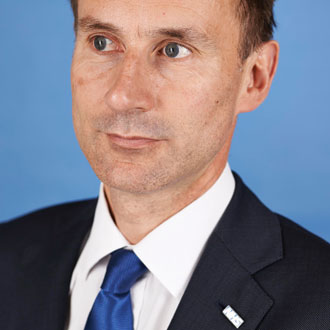Hunt confirms rollback on pre-election pledge of 5,000 new GPs

Jeremy Hunt has put more distance between the Government and its pre-election pledge to deliver 5,000 more GPs by 2020, as first revealed by Pulse, saying today that the figure was the ‘maximum’ that was achievable.
Speaking at the Health+Care show in London today, Mr Hunt said that the Department of Health was increasingly looking at the alternative primary care roles, such as physician associates and nurse practitioners to provide a sustainable workforce.
This comes after Pulse revealed on Monday that the secretary of state had already said the acute workforce crisis in some parts of the country meant that the Government would have to be ‘flexible’ about its 5,000 GPs pledge.
He told delegates at today’s conference that the DH now recognised that it may not have the time to train sufficient GPs, or persuade former GPs back to the workforce in order to meet its target.
The health secretary said a workforce study was under way to assess the extent of other primary care professionals in the NHS.
Mr Hunt said: ‘I talked about recruiting 5,000 more GPs on Friday. In truth, we think that is the maximum that we would be able to increase the GP workforce by, over the next five years. Given the time it takes to train new GPs; given the potential number of people who we can persuade to come back into the profession.’
Related stories
Hunt says there will be ‘flexibility’ in 5,000 GP target
‘New deal’: 1,000 new physicians associates by 2020
Government pledges 5,000 more pharmacists, nurses and physician associates
Pulse reported this week that the health secretary had modified the Government’s expectations in an off-camera Q&A immediately after launching the ‘new deal’ for general practice and committing to 5,000 more GPs,
He said last Friday: ‘We’ve said that we want the overall increase in the primary care workforce to be around 10,000, of which we anticipate around half will be GPs. But we are leaving some flexibility because in some parts of the country it is very hard to recruit GPs.’
However, DH spokespersons denied that this represented a watering down of the Conservatives’ pledge.
GP leaders warned pre-election that pledges of 5,000 new GPs were not achievable without a ‘Back to the Future Delorean’.
And Pulse has already revealed huge blackspots in recruitment to GP training, with more than 60% of places left unfilled in some parts of the country after this year’s first intake round.
This came after 12% of places were left unfilled nationally last year, amid tumbling application rates.
GPC chair Dr Chaand Nagpaul responded to the announcement, saying: ‘We are glad that after pressure from the BMA, the secretary of state is beginning to accept that we need to be more realistic about GP recruitment.
‘With such a limited workforce he now needs to rethink his plans for seven day services which cannot be practically delivered with the current shrinking number of GPs. There must also be serious steps taken to address the fundamental reasons why doctors do not want to be GPs, including delivering real and sustained investment to struggling practices, countering the negative stereotypes of GPs, reducing the burden of bureaucracy and enabling GPs to spend more time with their patients.’
Mr Hunt’s speech was followed by another talk on the ‘new deal’ by NHS England’s head of primary care development, Dr Robert Varnam, who told the audience that general practice had been working under severe funding and workforce constraints for years, which had been revealed in consultation with GPs.
Dr Varnam, who is a GP in Manchester, said: ‘Already at that time, and this was going back a few years, already the funding was starting to tail off, and actually since then we’ve seen major problems with premises and workforce. We’ve been sleepwalking into a workforce disaster in general practice for a number of years, and the acuity of the pressure that’s creating is now serious.
‘General practice is probably unsustainable without an awful lot of stuff being done, let alone reaching to beautiful visions of the future.’
Pulse July survey
Take our July 2025 survey to potentially win £1.000 worth of tokens













